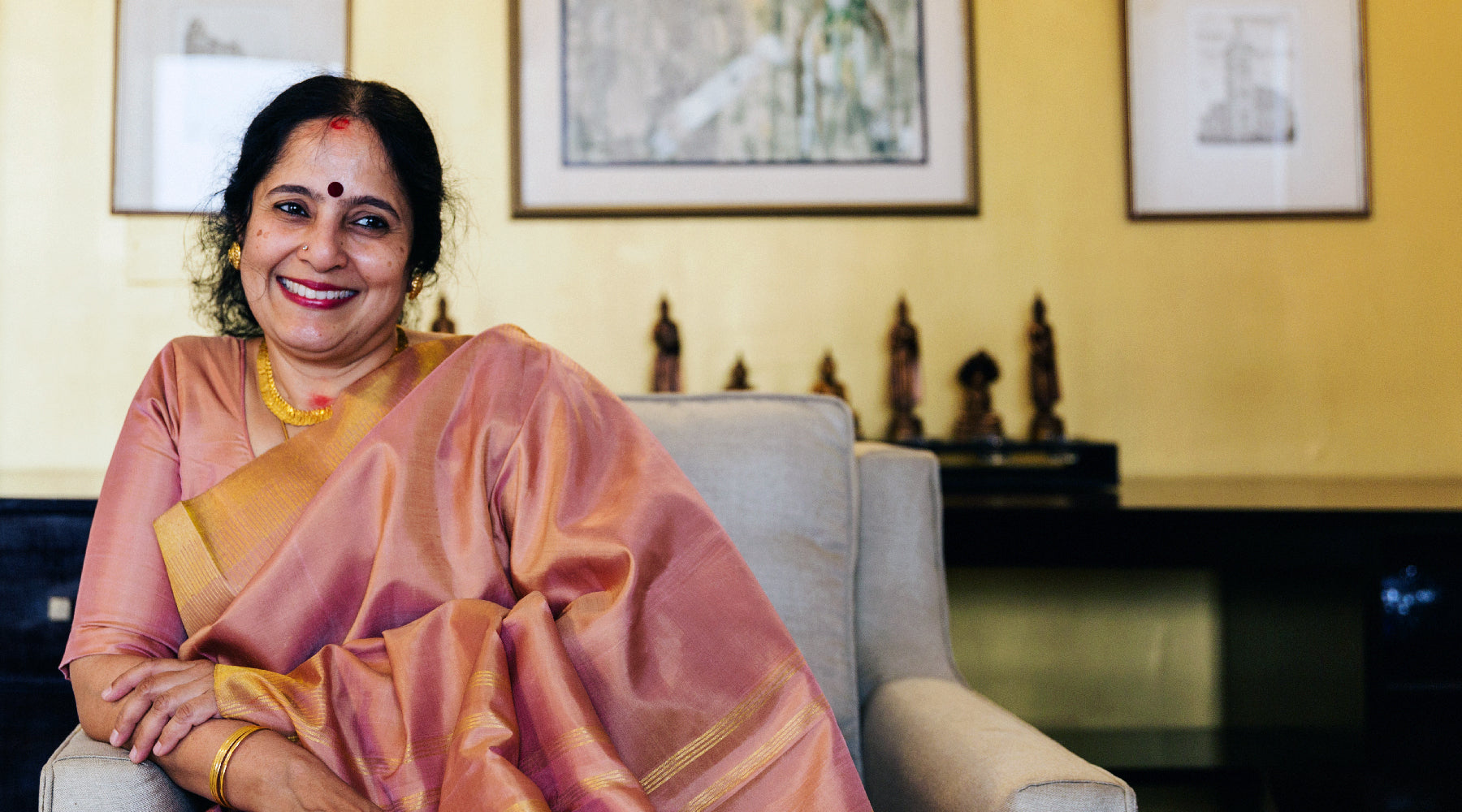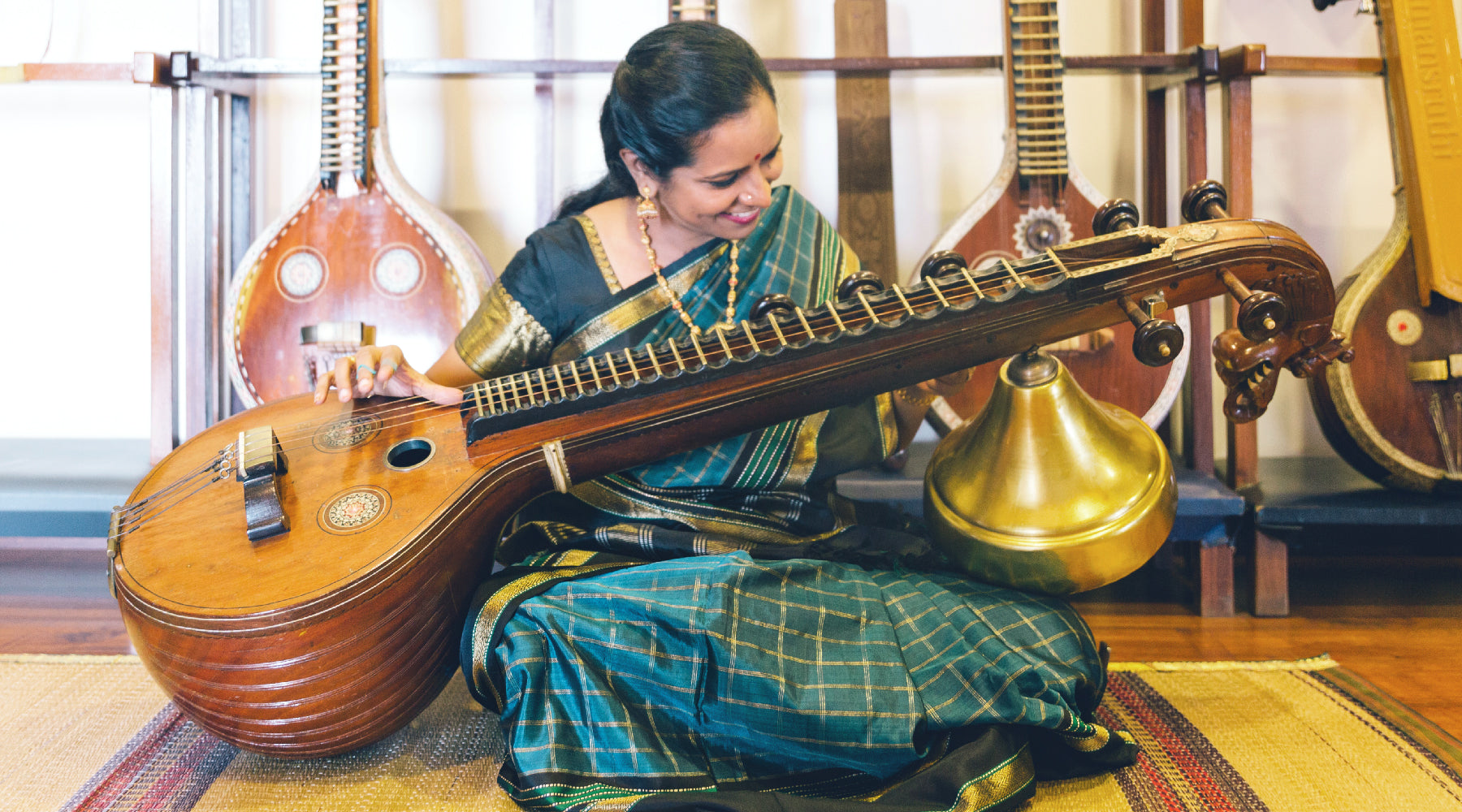KANAKAVALLI VIGNETTES : Dr.Anita Krishnan - Scaling Peaks

She might not have known that medicine was her true calling, but Dr. Anita Krishnan, a Bangalore-based ENT specialist, believes that going to medical school turned out to be one of the best decisions of her life. In conversation with Aneesha Bangera of the Kanakavalli Journal for the June edition of Vignettes, Dr Anita reminisces about her days as a schoolgirl in Kerala, and as a young teacher at medical school, sharing the lessons and stories that have made her the doctor she is today. A practitioner of the martial art of Taekwondo, and an avid trekker who recently scaled Mount Kilimanjaro, Dr Anita is as active outside the four walls of her clinic as she is within it. She tells us about her dreams for the future of healthcare in India, her abiding love for the sari – her favourite garment – and the motto that she lives by: ‘we are what we give, not what we are given’. In between patients, Taekwondo sessions and family commitments, Dr Anita takes the time to curate a selection of beautiful Kanakavalli kanjivarams that tell the story of her multifaceted personality.
Scaling Peaks
What did you dream of becoming when you were young? Was medicine always your calling?
As a child, I actually wanted to become an IAS officer. I grew up in a little town called Kollam (Quilon) in Kerala, where the highest official around was the District Collector, who was the Chief Guest at most public functions we attended as children. I was a good orator, and used to participate in various multicultural activities at school. As was the custom in the 1970s and 1980s, the person with the highest overall score at school was chosen to be the children’s representative for Children’s Day. And this role entailed sitting right next to the District Collector on the occasion, up the on the dais to deliver a speech. I got to do this for three years in a row at the Jawahar Bal Bhavan, and I was completely awestruck by the protocol and the power that the Collector’s office held. It was truly inspiring for a thirteen-year-old. My mother, however, had different plans for me. She was very keen to have a specialist doctor in the family, as there were none. She also believed that besides being academically bright, I was capable of great empathy, which she felt was the perfect personality for a doctor rather than a collector who might have to make very difficult and punitive decisions. Although I was unhappy at the time – as any teenager would be when advised to do something different from what she had set her mind to – in retrospect I think my mother was right. I think becoming a doctor was one of the best decisions I made. I love my profession and the opportunities it gives me to touch people’s lives. As a doctor, most of your work happens within clinics and hospitals. But as a trekker, you explore the wild outdoors.
Tell us a little bit about how you began trekking and what it means to you...
I have always been a lover of the outdoors. At school, I was part of the Scouts and Guides, and was among the first five girls to be awarded the President’s Guide Certificate, a high honour in the scouting community. As part of the training for this, we spent a lot of time training in the outdoors, learning signalling (we were taught the Morse code back then) and how to pitch a tent, among many other things. My interest in trekking and outdoor activities took a backseat however, once I began medical school and went on to become immersed in the various commitments that life brings. But about two years ago, a casual conversation with a friend turned out to be life-changing, in a way. She mentioned that she was going on a trek to Kilimanjaro, and I realised that she was going during her birthday week, and going all on her own. On an impulse, I said that I would go with her, because I didn’t want her to go alone! And before I knew it, I had started training aggressively, with barely four weeks left for the trek to begin. I would walk 10 to 15kms every day with a backpack weighing 7 or 8kgs. And I managed to summit the Uhuru peak on Mount Kilimanjaro, 19,000 feet above sea level and the highest point in Africa. For one, this experience reinforced my faith in the kindness and love of the greater power who I believe looks over all of us. The trek was an experience in aloneness that was truly unique – just me and the spectacular natural world around me. In the bustle of city life, we often forget the simple things, like the feeling of fresh air on our faces. Being in sync with nature gives us a deep feeling of peace. It was absolutely exhilarating to walk above the clouds and to actually scale the summit. It also gave me a lot of belief in the tenacity and grit of the human mind, because by the end of the trek, it was sheer willpower that kept me going to the peak. I hope to someday make it to Everest Basecamp and maybe to Machu Picchu too!
What role does taekwondo play in your life?
My tryst with the martial art of Taekwondo began about ten years ago. This art form keeps me physically fit and helps me to deal with the effects of spending long surgical hours on my feet. I believe martial arts also helps keep one calm and even-tempered. You extinguish all your frustrations and anxieties on the kicking mat, leaving it with a fresh and clear mind, ready to take on the day. It is something that I enjoy and that I greatly benefit from.
Could you tell us a little bit about your time as a teacher in a medical college? What are some of the things you most loved about teaching?
Early on in my career, I had the opportunity to work as a teacher at M S Ramaiah Medical College. The joy of teaching, I believe, is something that is very difficult to explain, and something that one must experience. I thoroughly enjoyed my experience of teaching eager nineteen-year-olds who were so keen to learn. I was the youngest faculty member at the time, so most students felt comfortable approaching me to clear their doubts and discuss their studies, and this was a very special time for me. I was even involved in organising multicultural events and graduation days, apart from academic programmes, and the experience truly transported me back to my own days as a student at medical school. What are your plans and dreams for the future of healthcare, and how would you like to play a role in this? For some years now, I have been toying with the idea of creating a platform to bring together the private and public sectors in the field of healthcare. I believe that there are so many incredibly trained and experienced doctors in the private sector who, if given the right platform, would love to do their bit and give back by logging a few hours every month in our overburdened public health system. I’m sure many of these fine doctors volunteer their time, but for this to be a truly effective measure, cutting through the red tape and making it easier for everyone involved, I think a mediator is required. And I would love to be that mediator. Once my children have grown up and gone to university, I hope to pursue this dream of making a difference, even if it is in a small way.

How would you define beauty?
For me, beauty is the whole package. It is not limited to external appearance. I feel that you are beautiful if you are able to connect to people at a deep and meaningful level, making them feel comfortable irrespective of their social status. In my life and work, I am able to help people not only by treating their physical illnesses, but just by giving them a little extra attention. Often, I realise that the physical symptom arises from some deep-rooted anxiety and all the person needs is a patient and caring person to give them some time, to listen to their problems and their stories. Every day I tell myself that I am going to do something good for someone else, and that is all that really matters to me. I believe that the impact of doing good is usually good. I live my life by the motto that we are what we give, not what we are given. And that, I feel, is what beauty is about.
What does the sari means to you in your personal and professional life?
I have been wearing saris every day from the age of 18. At the medical school I went to in the 1980s, it was compulsory for girls to wear saris. It has never been a chore for me to wear a sari; in fact, I think it is one of the most versatile and elegant garments I have ever worn. A good sari, I believe, is like an heirloom. I can truly feel the presence of my mother when I drape myself in some of her old kanjivaram saris. People say the same about diamonds, but I think a sari is forever! The sari is my go-to garment for any social event, and I love wearing it.

What’s the story of the kanjivaram you chose for the Vignettes?
For me, this sari was love at first sight. I was immediately struck by the detail and beauty of the weave. I love this rare shade of pink – it reminds me of a shade of English rose – and the fine silver zari work. I have been buying saris and jewellery from Ahalya for over a decade. Initially, I only had the chance to buy from Kanakavalli when they had exhibitions in Bangalore, and then online. So, I was thrilled when the Bangalore store opened its doors. With the bustle of everyday life, I hadn’t dropped in until recently. When I did visit the store with a friend, I chanced upon this beauty. I had to buy it because I really had fallen in love with it, even though I knew I would save up this rich kanjivaram for only the most special occasions.
- Dr.Anita Krishnan in conversation with Aneesha Bangera
Explore Anita's Kanakavalli curation here



